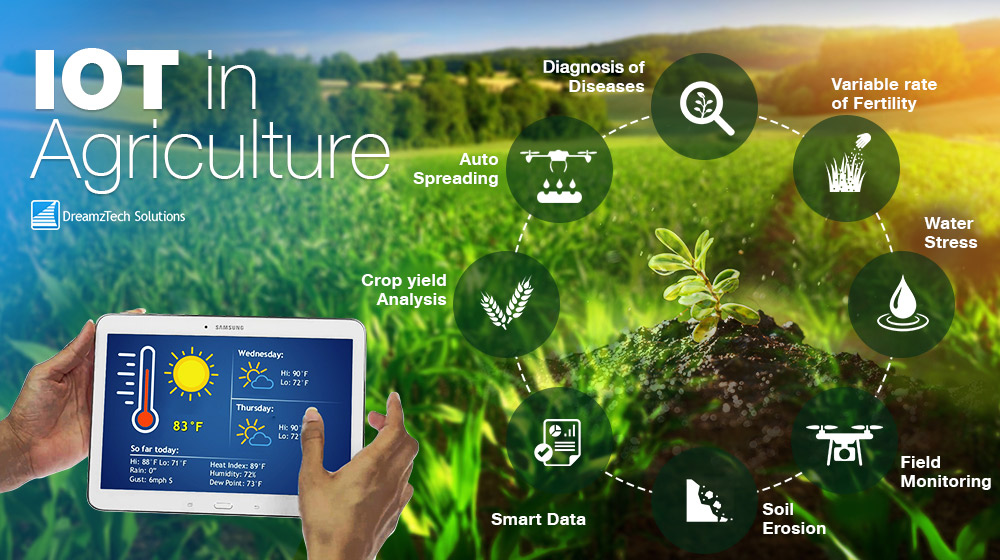According to Beecham research, the global population is expected to reach 9.6 billion. The increase in population makes it challenging for agriculture industry to meet the demand, especially with the effect of climate change to the agriculture industry. In addition to that, it is important to mention the shortage of labor working in agriculture industries. Thus, the agriculture industries have increased their adoption to new technologies to help them overcome the challenges regarding the increase of demand and shortage of labor in agriculture industries. Therefore, using the IoT in agriculture results smart farming which helps in increasing the operational efficiency, lower costs, reduce the waste, and improve the quality of their yield. Moreover, applying IoT technology in agriculture allows the farmers to monitor and automate the farms, which therefore helps to overcome the shortage in manpower.
What is Smart Agriculture?
Smart farming is simply applying IoT technologies to transform farming into smart farming. Therefore, building system where sensors are used to collect important data regarding the weather condition, soil moisture and based on these input data, actions will be taken automatically to achieve the optimum production.
Smart farming is also defined as a system that assists the farmer to monitor and control the field conditions from any place in the world as the IoT devices are always connected to the internet.
Benefits of Smart Farming
There are many benefits of smart farming that allows the farmers to reach higher revenue by helping them to make informed decision because of the data collected and analyzed with the help of IoT technology.
Some benefits of smart farming will be listed below:
-
Sensors used in smart farming collect data regarding the weather conditions, crops state, and soil quality, etc. This collected data will be helpful for the farmers to monitor their farms effectively.
-
It gives the farmers information regarding the expected output of the farm production. It basically informs the farmers of how much crops are going to harvest.
-
The increased control over the production in the smart farming allow for better management regarding the cost and waste.
-
Allows process automation in the farm which helps in controlling the irrigation, fertilizing, and pesticides systems automatically based analyzed data. Therefore, achieving better quality products.

Examples of The Use of IoT in Agriculture
Some examples describing the use of IoT in agriculture will be mentioned below to give an idea of how IoT technology can be applied and what are the outcomes of applying IoT in agriculture industry.
For example, Installing IoT sensors that measure the soil moisture, temperature, and electric conductivity will help the farmers to approach each crop’s unique needs individually.
Another example is livestock monitoring. The farmers that own large farms can benefit from the IoT applications to gather data related to location, well-being, and health of their cattle. This kind of information will assist the farmers to prevent the spread of disease in the herd by separating the sick animals which identified by the collected data from the sensors.
One more interesting example is building modern greenhouses by using solar powered and IoT sensors. Theses sensors can help the farmer monitoring the greenhouse state, water consumption, and energy consumption. IoT sensors collect information about light level, humidity, temperature, etc. The sensors then send the data collected to be analyzed in the cloud server to take an appropriate action by the actuators automatically, like opening the window, turning the on light, turning on the fan, etc. Which eventually, help the farmers to increase the greenhouse efficiency.
In the end, applying IoT in agriculture will provide effective solutions the agriculture industry to overcome the challenges regarding the increase in demand and shortage in labor in agriculture. The potential of IoT market is increasing, especially in agriculture industry. However, more technologies are developing to provide better solutions for the framers to help them increase the competitiveness and sustainability in their products.

